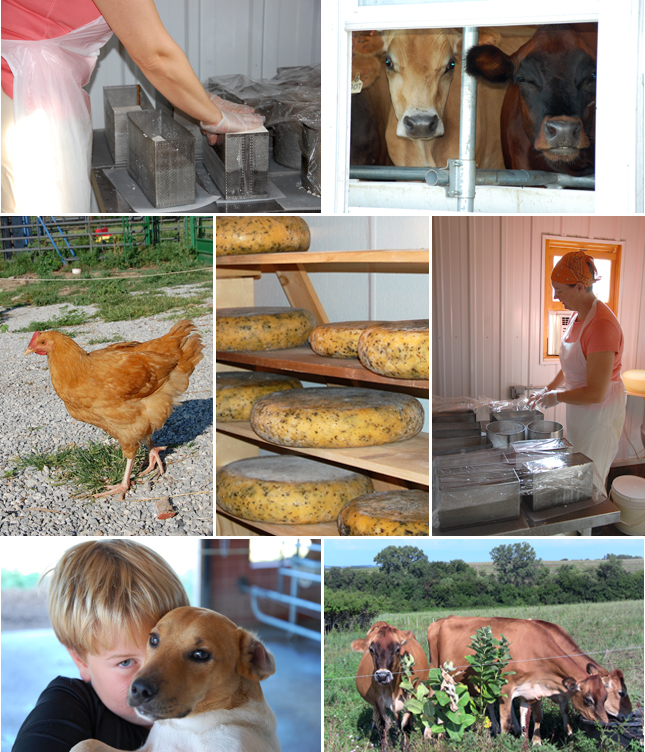Branched Oak Farm

Usually by late summer most of the sweeter grasses have been either grazed or have grown brittle in the heat and dryness. This year, however, has been exceptionally cool and wet so most of the fenced off pastures where the Jersey cows of Branched Oak Farm graze are still teeming with clover and other succulent grasses. With so much good grass under their noses the cows seem reluctant to be herded off to be milked.
Armed with a long pole herdsman Ben Gotschall gently moves sixteen cows and one bull down the path to the corral and milking room. He wryly explains that, “the bull comes along for ride, we don’t milk him.” When asked if he knows all the cows by name he says yes. “I can recognize them from the front and the back.” To demonstrate he calls out some of their names while we are standing behind them. Mona, Tiger, Dot, and Sissy respond by looking over their shoulders back at us. Ben grew up on a ranch in Atkinson, Nebraska. He is an MFA holder from the University of Idaho and author of a volume of poetry called, Where it Happened. After finishing his degree Ben started working at Branched Oak Farm.
Branched Oak Farm is owned by Doug and Krista Dittman of Raymond, Nebraska, a town sixteen miles north of Lincoln in an area that is called the “Bohemian Alps.” These so-called Alps are part of the range of uplands which runs in a line about fifty miles west of and parallel to the Missouri river and is reputed to resemble the same kind of plateau early Czech immigrants had come from starting in the 1850s.
The farm became a dairy in 2006 and was certified organic in 2007. Most of the milk produced by their herd of Jersey cows is used exclusively in their farmstead cheeses. They make Camembert, Gouda, Mozzarella and their most famous Lancaster Duet, which is a cow/goat’s milk cheese. “It has a pleasant tanginess with almost no acidity," says Greg O'Neil, co-owner of one of Chicago's pre-eminent wine, bread and cheese shops, Pastoral. They also make an award winning Quark, a whole milk version of cream cheese.
The milk produced on the farm has been called “liquid gold,” given its pale yellow color. Krista Dittman explains that, “Grass makes the cow’s milk extra yellow. There’s extra beta-carotene that shows in the milk and makes for a brilliant yellow cheese.” The milk is also high in butter-fat.

To reduce the stress of milking the Dittmans only milk once a day during the cow’s normal milk-producing cycle. Other cows in larger, commercial dairies that subsist on a diet comprised of grain or cut grasses usually produce two calves and have two lactations in their lifetimes before being “retired.” The Jerseys at Branched Oak Farm produce 10-12 calves and as many lactations. Relative to their competitors, many of whom use steroids and antibiotics to increase milk output, the amount of milk produced at Branched Oak Farm is less. This doesn’t bother Krista, “We try to be better stewards of the land instead of paying attention to the whims of the commodity milk market. We’re more about ecological sustainability instead of economic viability.”
Branched Oak Farm is like an organism unto itself. Each facet has a relationship to the other. They keep chickens to keep the tick and grasshopper population under control. The pastures are grazed in rotation and milkweeds are allowed to grow to attract butterflies and bees. Bluebird boxes have been placed about the property to attract these desirable birds. Presently the farm is participating in a study to determine the effects of spraying whey, a clean, nitrogen-rich byproduct of cheese making as an alternative to chemical-based fertilizer. “We like to think of this business as a three legged milk stool. Each leg represents something, the economic, the social and the sustainable. Everything rests on those three principles. We’re always asking is it good, clean and fair. It’s important the whole transaction from beginning to end is fair.”

When Krista got in to cheese making in 2003 she visited 28 farmsteads in the US and in Europe. “It’s good to see what everyone is doing,” she says, “Everyone is doing something interesting and unique. For some they’re just trying to make some money off their extra milk, for others they have a specific cheese in mind.” Along with her travels she has attended courses in California and Wisconsin. The day Native Food and Wine caught up with her she had just returned from the American Cheese Society’s Annual Conference in Austin, Texas the night before.
“There are more things in the equation, revenue versus hours of labor, versus money in the bank,” says Dittman. “There’s also room in the equation for birds, butterflies and many others things other than just the bottom line.”
Like many other artisans Branched Oak is not yet making a profit. Supporting producers that act with such responsibility is vital if we are to improve our food systems.
Contact:
Branched Oak Farm
Doug & Krista Dittman
17015 NW 70th St.
Raymond, NE 68428
402-783-2124
branchedoakfarm@windtream.net
www.branchedoakfarm.com
A word about milk….
Reading product labels can be like reading a college chemistry book. There are all sorts of mysterious additives and preservatives and acronyms for things that not only look unnatural but a touch unholy. One of the entities floating around in some milk is artificial growth hormone. Most commercial dairy producers inject their cattle with a hormone so the cows will produce more milk. With growing concerns about the usage of rBST (a.k.a. rBGT), developed by Monsanto, it is reassuring to learn about organic farms like Branched Oak and hear about their stewardship of the land and their animals. Read about growth hormone at Sustainable Table.






 Share Article
Share Article